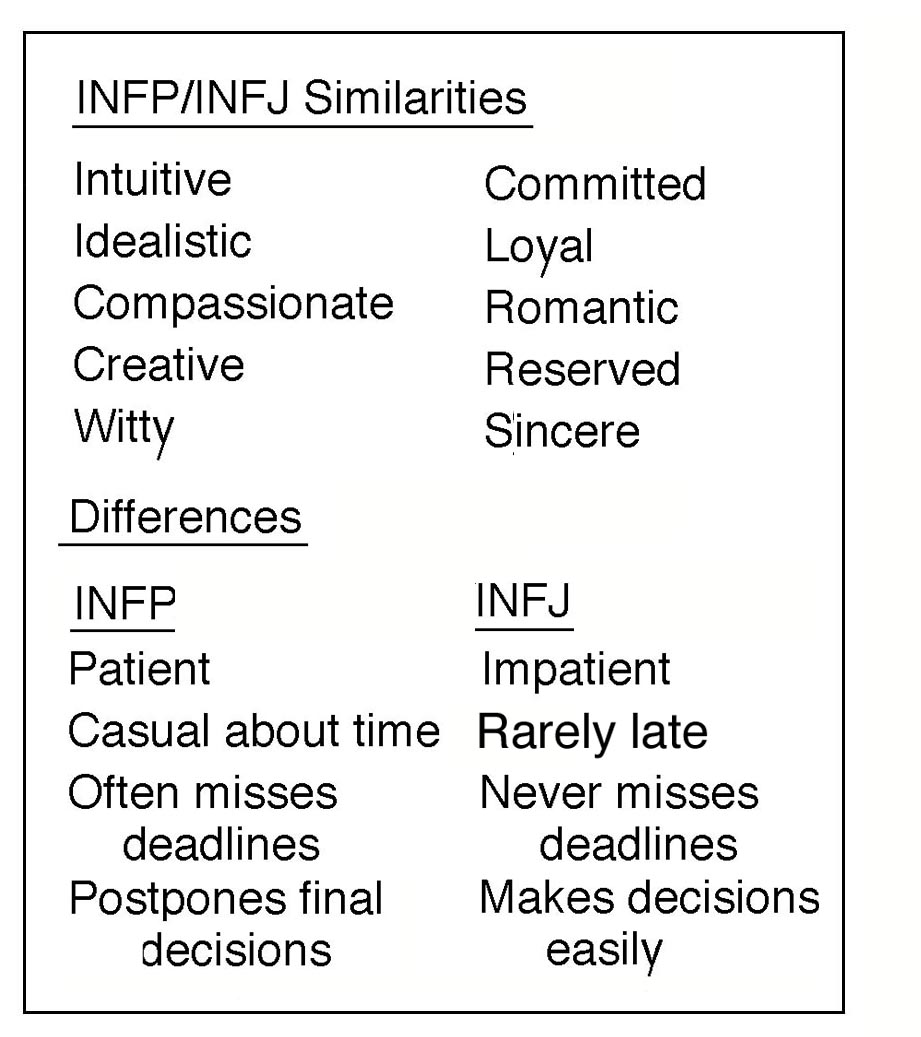INFJ Meets INFP
- Aria Fox
- April 8, 2023
INFP (introverted-intuitive-feeling-perceiving) and INFJ (introverted-intuitive-feeling-judging) types are a lot alike. They have rich inner lives and treasure their solitude. Also, their intuition is highly developed, giving them the ability to see what’s going on under the surface. They understand why people do the things they do. Because they see through facades and games, deceivers and players can seldom fool them for long. INFPs and INFJs examine every piece of evidence for its fundamental truth and then seek the wider context into which it fits.
As idealists, both types drive themselves to achieve their goals, which are frequently humanitarian. If they don’t have the luxury of choosing careers that meet their needs, they spend much of their spare time helping others. Their values are strong and their principles firm—unless they find a valid reason to change them. Their biggest question is, “What’s my purpose?”

INFPs and INFJs set such high standards for themselves that they’re often disappointed in the results of their work. Because they don’t give themselves enough credit, they make good partners. Each supports and encourages the other.
They protect their privacy. When they’re not allowed enough time alone, they feel drained. They need solitude to recharge their batteries and get their energy back.
As friends and partners, they understand this and are usually generous about giving each other space.
Both are somewhat prone to depression. Their introversion inclines them to be loners, giving them the tendency to brood over problems without checking the facts with others. Their feeling preference inclines them to exaggerate the importance of conflicts or hurt feelings.
Both types are generally well liked due to their warmth and sincerity. They make good listeners, put others at ease, and are valued as friends and confidantes.
Intuition (N)
The intuitive skills shared by the INFP and INFJ form their strongest bond. They usually agree on important matters. Due to differences in their perceiving and judging functions, however, they don’t always carry out practical tasks in the same way. The INFP may start a painting project, then leave it half-finished—intending to finish at a more convenient time. INFJs aren’t happy until the job is complete.
As intuitive individuals, they sift through their experiences to discover their meaning. How does the evidence fit into the big picture? People with a sensing preference, whose intuition is less developed, tend to accept things at surface value. They see no point in overthinking matters. As a result, they may fail to appreciate the insights and predictions of INFPs and INFJs—sometimes at their peril.
Work
INFPs and INFJs frequently find careers in fields requiring verbal skills. They cooperate and communicate effectively with others. Often they hold medical or social service jobs. Their sharp intuition helps them solve problems, their feeling function encourages people to trust them, and their introversion gives them time to contemplate the complex factors in situations. They prefer careers that don’t emphasize details but focus on patterns.
Counseling and mental health therapy are common careers among INFPs. INFJs do this work, too, but they can be less patient with clients’ progress. Because of their judging function, they often make the best writers. They use their verbal skills to build constructs, put them on paper, and get them published.
While both types get along with others, group projects frustrate them. They get annoyed by co-workers who don’t live up to their standards or fail to see the big picture. They generally remain polite, but inside they may be seething. When an INFP and INFJ collaborate on projects, they may have conflicts over deadlines as the former dawdles and the latter pushes to finish on time.
Taking on too much to please others is a problem they have in common. Also, they may give colleagues the impression that they agree on the details of a project when in fact they do not. They need to assert themselves more and learn to be honest, giving negative feedback when it’s important. They need to make sure their own needs are met, too—asking for a raise, for example, when it’s deserved.
INFPs make effective mediators in the workplace—especially in situations where they have no self-interest. They are less likely to take sides than INFJs. They want to hear everything. INFJs can draw conclusions too quickly.
Romance
When INFPs fall in love with INFJs, the natural reserve of the former makes it hard for them to express their affection in words. It’s a little easier for the INFJ, who can also be shy but is better at taking action. Both can be eloquent in their physical expressions of love. As lovers, they are tender and creative. This helps keep the relationship anchored.
The two types are sensitive and easily hurt.
One or the other can easily misinterpret a casual statement, offhand action, or forgotten promise and feel rejected.
When one says, “I’ll be late tonight” as he or she leaves the house and means nothing more than that, the other may give the statement a sinister interpretation.
To avoid bruised egos, they need to remember the importance of frequent reality checks.
Both tend to overdramatize situations and ignore the simple facts. When a disagreement comes up, they can get out of touch with each other. They have to release their ego investment and back-pedal in order to find common ground.
They tend to be absent-minded, too, which can be annoying for everyone. Where are the house keys? Did anyone let the cat in this morning? What time were we supposed to be there? Both are likely to shrug and say they don’t know.
Fortunately, they’re tolerant of each other because they share the inability to recall the concrete details of life. Such mundane matters don’t hold their attention.
Family Life
As parents, both types listen attentively to each other and their children, although INFJs are slightly less patient because of their judging function. They’re more likely to interrupt a conversation to see where it’s going. The INFP is content to listen without closure. INFPs wait to think about what’s been said before deciding what to do.
They avoid conflicts. Under normal conditions, they’re courteous and respectful, seldom raising their voices. When a problem comes up, they talk it over. The difference is that INFJs have a stronger need to decide who’s right and who’s wrong, while the INFP’s main goal is to preserve good will in the family. Both get rattled by conflict, but the INFJ is more likely to stand his or her ground on critical issues.
When it’s time for a vacation, INFJ parents are generally the chief planners. Their inclination to arrange details before checking them out with the family can cause problems, but after they’ve set off, the parents have no problem giving everyone time alone. After all, they want that, too. When the family re-gathers, they relax and have fun.
Nurturing their children comes naturally to INFPs and INFJs. They are patient, devoted, and protective parents. However, when friction arises over, say, a child’s behavior, they tend to keep their objections to themselves longer than they should. Eventually the INFJ in particular is likely to blow up.
Famous INFPs and INFJs
INFPs and INFJs whose four Myers-Briggs functions are healthy and well developed can accomplish great things, although they are generally humble about them.

Abraham Lincoln was an INFP—moody, quiet, gentle, witty and determined. As his law partner described him: “He cared little for simple facts. He cared for the underlying principle of truth and justice.” Other famous INFPs include J.R.R. Tolkien, Virginia Woolf, Vincent van Gogh, and John Lennon.

Thomas Jefferson was an INFJ. A historian described Jefferson’s character as having “a too-good-for-this-world streak that showed itself in many ways, from his mountaintop house, to his dislike of face-to-face argument.” Other famous INFJs include Carl Jung, Mahatma Gandhi, Agatha Christy, Leonard Trotsky, and Michelle Pfeiffer.
